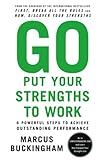A lot of people that I talk to say “I can’t do everything David Allen outlines in Getting Things Done, but I took away a few key ideas that have made a big impact.” And the main take-away they describe is usually very helpful.
So I’m thinking of having a call-out in the book that highlights the top things various people have taken away from Getting Things Done. I’ve been asking this question of some people I’ve interviewed for the book, and I’d love to hear your thoughts as well.
Just shoot me an email or add a comment below answering this question: “What is the most helpful thing you learned from Getting Things Done?”


